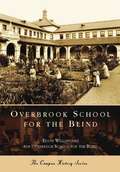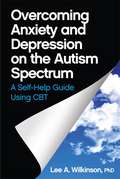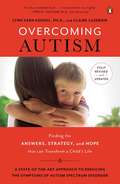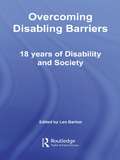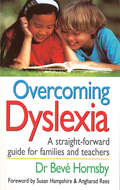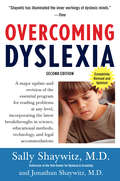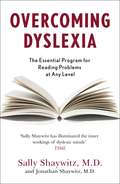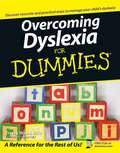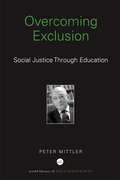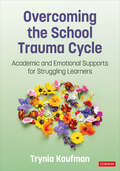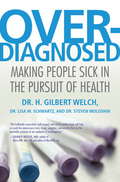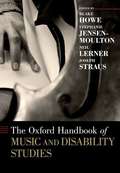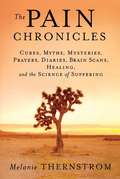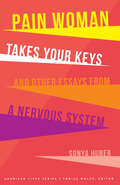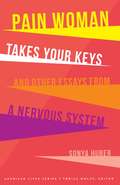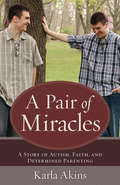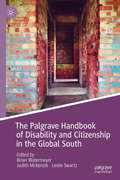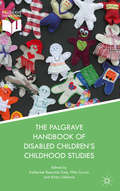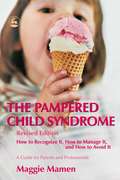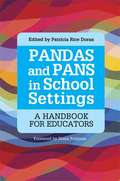- Table View
- List View
Overbrook School for the Blind (The Campus History Series)
by Edith WilloughbySince 1832, Overbrook School for the Blind has been a leader in providing educational programs to children and young people who are blind and visually impaired. Julius Friedlander, the schools founder, and other early leaders worked hard to inform people about the educational needs of the children. Their efforts resulted in providing reading material for the blind and Overbrook's production of the first embossed book in America, the Gospel of Mark, and the publication of the first magazine for the blind, Lux en Tenebrae. Offering students access to all educational opportunities continues to be the schools main goal, and in the early 1990s, Overbrook pioneered the development of a school wide technology initiative that provided students with the ability to access the curriculum, communicate, and be successful in employment. Through rare photographs and documents, Overbrook School for the Blind offers a glimpse at the schools role in reaching out to people who are blind and it showcases how Overbrook has helped thousands of students to achieve independence, self-confidence, and the skills to experience active and fulfilling lives.
Overcoming Anxiety and Depression on the Autism Spectrum: A Self-Help Guide Using CBT
by Lee WilkinsonCognitive Behavioral Therapy (CBT) has been shown to be effective for treating mental health problems such as anxiety and depression in individuals both with and without autism spectrum disorders. This book bridges the gap between research and practice and shows adults on the spectrum practical ways to manage their emotions. Many adults on the autism spectrum experience isolation, interpersonal difficulties, anxiety, depressed mood, and coping problems. By applying theory and concepts from autism research, this book will help adults on the spectrum to understand their challenges. The author takes the best of CBT self-help strategies, to encourage self-analysis, and to help adults on the spectrum make better decisions in activities such as employment or relationships. This is an essential self-help guide for adults on the spectrum looking for ways to cope with emotional challenges, and will also be a useful resource for clinicians, psychologists, therapists, and counselors working with them.
Overcoming Autism
by Lynn Kern KoegelWith a 300 percent increase in the incidence of autism and autism spectrum disorders and 1 in 150 children being diagnosed with the disability, autism is now an epidemic. Fortunately, there have been huge advances in our ability to diagnose the disability at younger ages and in the development of effective interventions that can change children's lives. In Overcoming Autism, Lynn Kern Koegel, Ph. D. , one of the most well-known and highly respected experts on treating autism, shares her professional advice while coauthor Claire LaZebnik, a professional writer whose son has autism, provides insight into the daily life of parents coping with autism. It's a difficult disability to live with, but it doesn't have to devastate a family. In this book, Koegel and LaZebnik offer concrete ways to immediately begin improving the symptoms of autism and the emotional life of anyone coping with the disorder. Providing a complete program of strategies that can be tailored to any child's specific needs, this is a must-read, must-own book that offers hope through practical solutions which are warm, nurturing, and designed to fit into a family's daily life. The writers never lose sight of the humor that lurks in the quirkiness of the disability or the importance of enjoying and loving your child.
Overcoming Autism: Finding the Answers, Strategies, and Hope That Can Transform a Child's Life
by Lynn Kern Koegel Claire LazebnikWith a 300 percent increase in the incidence of autism and autism spectrum disorders and 1 in 150 children being diagnosed with the disability, autism is now an epidemic. Fortunately, there have been huge advances in our ability to diagnose the disability at younger ages and in the development of effective interventions that can change children's lives. In Overcoming Autism, Lynn Kern Koegel, Ph. D. , one of the most well-known and highly respected experts on treating autism, shares her professional advice while coauthor Claire LaZebnik, a professional writer whose son has autism, provides insight into the daily life of parents coping with autism. It's a difficult disability to live with, but it doesn't have to devastate a family. In this book, Koegel and LaZebnik offer concrete ways to immediately begin improving the symptoms of autism and the emotional life of anyone coping with the disorder. Providing a complete program of strategies that can be tailored to any child's specific needs, this is a must-read, must-own book that offers hope through practical solutions which are warm, nurturing, and designed to fit into a family's daily life. The writers never lose sight of the humor that lurks in the quirkiness of the disability or the importance of enjoying and loving your child.
Overcoming Disabling Barriers: 18 Years of Disability and Society (Education Heritage)
by Len BartonThis book provides a valuable route map to the development of thinking in disability studies over the last eighteen years. It includes over twenty essential articles from the journal Disability and Society, written by many of the leading authors in the field from the UK, the USA, Australia and Europe. Compiled by the current editors of the journal, it is divided into three sections which mirror the three central themes: disability studies – clearly illustrates the debates and challenges that have emerged within the field over the last two decades policy – offers a snapshot of social policy that has impinged on the lives of disabled people in many parts of the world research issues – reveals the inequalities between disabled and non-disabled people and the advocacy of new methods and research practices. The editors’ specially written introduction to each section contextualises the selection and introduces students to the main issues and current thinking in the field. Altogether this book is a rich source of ideas and insights covering conceptual, theoretical, empirical and cross-cultural issues and questions.
Overcoming Dyslexia
by Dr Beve HornsbyDyslexia is a common diagnosable condition that is estimated to affect at least one child in ten. In its most usual form it is manifested as a difficulty in learning to read and write, but it is widely misunderstood and often mistaken for low intelligence or even laziness. Dr Beve Hornsby combines her experience as a psychologist, teacher and speech therapist in this informative and reassuring book for parents and teachers of children suffering from a disability no-one can see or understand, and offers advice on how to identify, tackle and eventually overcome dyslexia. Includes up-to-date information on Attention Deficit Disorder and the relevance of the latest Education Act.
Overcoming Dyslexia: A New and Complete Science-based Program for Reading Problems at Any Level
by Sally ShaywitzFOR EVERYONE WHO STRUGGLES TO READ! Clear, practical, science-based information and advice for successful results. One in five American children has trouble reading. But they are not stupid or lazy. In Overcoming Dyslexia, Dr. Sally Shaywitz, co-director of the Yale Center for the Study of Learning and Attention and a leader in the new research into how the brain works, offers the latest information about reading problems and proven, practical techniques that, along with hard work and the right help, can enable anyone to overcome them. Here are the tools that parents and teachers need to help the dyslexic child, age by age, grade by grade, step by step.--What dyslexia is and why some intelligent, gifted people read slowly and painfully--How to identify dyslexia in preschoolers, schoolchildren, young adults, and adults--How to find the best school and how to work productively with your child's teacher--Exercises to help children use the parts of the brain that control reading--A 20-minute nightly home program to enhance reading--The 150 most common problem words-a list that can give your child a head start--Ways to raise and preserve a child's self-esteem and reveal his strengths--Stories of successful men and women who are dyslexic.
Overcoming Dyslexia: Second Edition, Completely Revised and Updated
by Sally E. Shaywitz Jonathan ShaywitzA major update and revision of the essential program for reading problems at any level, incorporating the latest breakthroughs in science, educational methods, technology and legal accommodations. 'Sally Shaywitz is an amazing woman... no one has a better understanding of dyslexia' - Bob DylanDyslexia is the most common learning disorder in the world, affecting one in five individuals. Now Drs Sally and Jonathan Shaywitz give us a substantially updated and augmented edition of her classic work, Overcoming Dyslexia, drawing on an additional fifteen years of ground-breaking scientific research to offer new information on both the big picture and the specific details of dyslexia and reading problems, and providing the tools that parents, teachers and dyslexic individuals of any age need. This updated edition offers:* New chapters on the latest science-based diagnosis of dyslexia, identifying the at-risk child, dyslexia in post-menopausal women, and implications of associated anxiety and ADHD in dyslexia* State-of-the-art information on universal screening for dyslexia as early as the first year of school - why and how to efficiently and effectively screen young children* An expanded chapter on choosing the best school for a dyslexic child and new chapters examining exciting innovative school models* New chapters focused on higher education, including preparing a dyslexic for university, choosing a university or higher education course for a dyslexic student and making the university experience work* The latest advances in digital technology that increase a dyslexic's ability to help him or herself* Extensively updated material on helping dyslexic individuals of all ages become better readers, with detailed home programs to enhance reading at different ages and levels* How to use compassion and exciting new knowledge to build and strengthen a child's self-esteem and resilience * Insightful stories of outstanding men, women and young adults who are dyslexic and thriving and how they succeeded. Acclaimed by experts and parents alike, Overcoming Dyslexia provides anyone who is struggling with reading problems with the necessary reassurance that, through hard work and the right help, such difficulties can be overcome.
Overcoming Dyslexia For Dummies
by Tracey WoodIncludes tips and strategies for kids, teens, and adults with dyslexia Understand what dyslexia is, assess schools and programs, and help your child succeed Does your child mix up d's and b's? Does he or she have trouble reading? If so, the cause may be dyslexia. But don't worry -- these days, there are many ways to overcome dyslexia. This hands-on guide leads you step by step through your options -- and explains how anyone with dyslexia can achieve success in school and life. Discover how to * Recognize the symptoms of dyslexia * Understand diagnostic test results * Set up an Individualized Education Program (IEP) * Work effectively with teachers * Improve your child?s reading skills
Overcoming Exclusion: Social Justice Through Education (World Library of Educationalists)
by Peter MittlerIn this Collected Works, Professor Peter Mittler brings together twenty-one of his key writings in one essential volume, providing a distinctive commentary on some of the most important issues in education over the last thirty years. This unique collection illustrates the development of Professor Mittler’s thinking over the course of a long and esteemed career, encompassing his work on the origins of under-achievement, the ways in which obstacles to learning can be understood and overcome and the importance of human rights for all marginalised minorities. It follows the thread of his growing awareness that human development depends on a series of complex interactions between the ‘double helix’ of nature and nurture. One of the world’s most respected and eminent scholars of the field of special needs and inclusive education, Professor Mittler includes chapters from his best-selling books and selected articles from leading journals, providing the reader with a chronological and global perspective on his work and thinking, and the impact it had at and beyond the time of writing.
Overcoming the School Trauma Cycle: Academic and Emotional Supports for Struggling Learners
by Trynia KaufmanDisrupt the painful cycle of academic challenges and emotional distress When students struggle with learning, it can be stressful for both them and their teachers. Struggling learners are more likely to experience low self-esteem, anxiety, depression, and behavioral issues—challenges that, combined with highly stressful learning experiences, can tip students into a trauma response that makes learning even harder. Overcoming the School Trauma Cycle explores the science behind how learning occurs in the brain, how it can be disrupted, and—most importantly—how to overcome the painful cycle of academic challenges and emotional distress. Inside, you′ll find: What the latest research tells us about how mental health issues can disrupt the learning process How academic and mental health challenges can fuel each other Manageable, whole-class practices and targeted supports to meet struggling learners’ academic and emotional needs Opportunities to self-assess and reflect Many schools have increased their focus on trauma-informed teaching and social-emotional learning, but these approaches are too often pitted against academic rigor when they are really two sides of the same coin. To improve outcomes for all students, we must address their social-emotional needs alongside their academic ones. In Overcoming the School Trauma Cycle, you′ll discover empowering practices to help all students learn and thrive.
Overcoming the School Trauma Cycle: Academic and Emotional Supports for Struggling Learners
by Trynia KaufmanDisrupt the painful cycle of academic challenges and emotional distress When students struggle with learning, it can be stressful for both them and their teachers. Struggling learners are more likely to experience low self-esteem, anxiety, depression, and behavioral issues—challenges that, combined with highly stressful learning experiences, can tip students into a trauma response that makes learning even harder. Overcoming the School Trauma Cycle explores the science behind how learning occurs in the brain, how it can be disrupted, and—most importantly—how to overcome the painful cycle of academic challenges and emotional distress. Inside, you′ll find: What the latest research tells us about how mental health issues can disrupt the learning process How academic and mental health challenges can fuel each other Manageable, whole-class practices and targeted supports to meet struggling learners’ academic and emotional needs Opportunities to self-assess and reflect Many schools have increased their focus on trauma-informed teaching and social-emotional learning, but these approaches are too often pitted against academic rigor when they are really two sides of the same coin. To improve outcomes for all students, we must address their social-emotional needs alongside their academic ones. In Overcoming the School Trauma Cycle, you′ll discover empowering practices to help all students learn and thrive.
Overdiagnosed: Making People Sick in the Pursuit of Health
by H. Gilbert WelchFrom a nationally recognized expert, an exposé of the worst excesses of our zeal for medical testingGoing against the conventional wisdom reinforced by the medical establishment and Big Pharma that more screening is the best preventative medicine, Dr. Gilbert Welch builds a compelling counterargument that what we need are fewer, not more, diagnoses. Documenting the excesses of American medical practice that labels far too many of us as sick, Welch examines the social, ethical, and economic ramifications of a health-care system that unnecessarily diagnoses and treats patients, most of whom will not benefit from treatment, might be harmed by it, and would arguably be better off without screening.Drawing on twenty-five years of medical practice and research on the effects of medical testing, Welch explains in a straightforward, jargon-free style how the cutoffs for treating a person with "abnormal" test results have been drastically lowered just when technological advances have allowed us to see more and more "abnormalities," many of which will pose fewer health complications than the procedures that ostensibly cure them. Citing studies that show that 10 percent of two thousand healthy people were found to have had silent strokes, and that well over half of men over age sixty have traces of prostate cancer but no impairment, Welch reveals overdiagnosis to be rampant for numerous conditions and diseases, including diabetes, high cholesterol, osteoporosis, gallstones, abdominal aortic aneuryisms, blood clots, as well as skin, prostate, breast, and lung cancers.With genetic and prenatal screening now common, patients are being diagnosed not with disease but with "pre-disease" or for being at "high risk" of developing disease. Revealing the economic and medical forces that contribute to overdiagnosis, Welch makes a reasoned call for change that would save us from countless unneeded surgeries, excessive worry, and exorbitant costs, all while maintaining a balanced view of both the potential benefits and harms of diagnosis. Drawing on data, clinical studies, and anecdotes from his own practice, Welch builds a solid, accessible case against the belief that more screening always improves health care.
The Owl Project: A programme of outdoor activities for children in primary schools
by Eloise BruceThe OWL Project is a programme of activities to enable anybody working with primary school age children to help them to develop essential skills for social and emotional wellbeing through nature and gardening activities. If you want to get children outdoors but don’t know where to start, this book is for you. With step-by-step plans, this unique book gives you the tools you need to support children in the natural environment no matter how small your outside space or budget. The session plans include games, gardening activities, social skills starters, and resource suggestions. It is designed to be easy to read and even easier to implement and offers ideas for every season.
The Oxford Handbook of Music and Disability Studies
by Blake Howe Stephanie Jensen-Moulton Neil Lerner Joseph StrausThe Oxford Handbook of Music and Disability Studies represents a comprehensive state of current research for the field of Disability Studies and Music. The forty-two chapters in the book span a wide chronological and geographical range, from the biblical, the medieval, and the Elizabethan,through the canonical classics of the eighteenth and nineteenth centuries, up to modernist styles and contemporary musical theater and popular genres, with stops along the way in post-Civil War America, Ghana and the South Pacific, and many other interesting times and places. Disability is a broad, heterogeneous, and porous identity, and that diversity is reflected in the variety of bodily conditions under discussion here, including autism and intellectual disability, deafness, blindness, mobility impairment often coupled with bodily difference, and cognitive and intellectual impairments. Amid this diversity of time, place, style, medium, and topic, the chapters share two core commitments. First, they are united in their theoretical and methodological connection to Disability Studies, especially its central idea that disability is a social and cultural construction. Disability both shapes and is shaped by culture, including musical culture. Second, these essays individually and collectively make the case that disability is not something at the periphery of culture and music, but something central to our art and to our humanity.
P.S. Your Not Listening
by Eleanor CraigNo school would take these children. Some were violent. Others were withdrawn. All were deeply disturbed. When Eleanor Craig took on the assignment to teach a class of special children who had been declared "unteachable" by others, she knew it wouldn't be easy. How do you teach long division to a child who believes that the banana in his lunchbox is alive and trying to escape? How do you maintain control when one of your students has locked you in the custodian's closet? How do you convince a child that people are not for hurting when he is constantly battered and rejected at home? During the year in which she taught a "transitional class" of acutely disturbed children, Eleanor Craig grappled with such problems each bewildering and exhausting day. P.S. Your Not Listening is the deeply-felt and often touching account of Mrs. Craig's attempts to reach her five exceptional pupils. Having no guidelines but her own empathy and resourcefulness, Mrs. Craig tries to reach the center of the children's chaotic world and to gain their trust. Gradually, she begins to establish human contact. Gradually, the children become more responsive. But the setbacks are many and the progress painfully slow. Eddie can only speak through aggression. Kevin's shoes tap out his anger. Violent fights flare up between Eddie and Douglas: Julie hides under her desk while Jonathan calls into his inkwell for help and Kevin urges Douglas to kill Eddie. Yet in the lulls between such destructive outbursts, Mrs. Craig perceives a real, if hesitant, sense of community emerging in the classroom. There are moments of celebration, as on the day that Jonathan, who believed he was a ghost and not a real boy, exclaims, "Doesn't it feel funny to wake up in the morning and say 'Who am I?' Doesn't it feel funny to wake up in the morning and be a human being?" P.S. Your Not Listening is ultimately not so much a book about education as a book about love.
The Pain Chronicles: Cures, Myths, Mysteries, Prayers, Diaries, Brain Scans, Healing, and the Science of Suffering
by Melanie ThernstromEach of us will know physical pain in our lives, but none of us knows when it will come or how long it will stay. Today as much as 10 percent of the population of the United States suffers from chronic pain. It is more widespread, misdiagnosed, and undertreated than any major disease. While recent research has shown that pain produces pathological changes to the brain and spinal cord, many doctors and patients still labor under misguided cultural notions and outdated scientific dogmas that prevent proper treatment, to devastating effect. In The Pain Chronicles, a singular and deeply humane work, Melanie Thernstrom traces conceptions of pain throughout the ages---from ancient Babylonian pain-banishing spells to modern brain imaging---to reveal the elusive, mysterious nature of pain itself. Interweaving first-person reflections on her own battle with chronic pain, incisive reportage from leading-edge pain clinics and medical research, and insights from a wide range of disciplines: science, history, religion, philosophy, anthropology, literature, and art. Thernstrom shows that when dealing with pain we are neither as advanced as we imagine nor as helpless as we may fear. Both a personal meditation and an intellectual exploration,The Pain Chronicles illuminates and makes sense of the all-too-human experience of pain and confronts with extraordinary grace and empathy its peculiar traits, its harrowing effects, and its various antidotes.
Pain Woman Takes Your Keys, and Other Essays from a Nervous System (American Lives)
by Sonya HuberRate your pain on a scale of one to ten. What about on a scale of spicy to citrus? Is it more like a lava lamp or a mosaic? Pain, though a universal element of human experience, is dimly understood and sometimes barely managed. Pain Woman Takes Your Keys, and Other Essays from a Nervous System is a collection of literary and experimental essays about living with chronic pain. Sonya Huber moves away from a linear narrative to step through the doorway into pain itself, into that strange, unbounded reality. Although the essays are personal in nature, this collection is not a record of the author’s specific condition but an exploration that transcends pain’s airless and constraining world and focuses on its edges from wild and widely ranging angles. Huber addresses the nature and experience of invisible disability, including the challenges of gender bias in our health care system, the search for effective treatment options, and the difficulty of articulating chronic pain. She makes pain a lens of inquiry and lyricism, finds its humor and complexity, describes its irascible character, and explores its temperature, taste, and even its beauty.
Pain Woman Takes Your Keys and Other Essays from a Nervous System (American Lives Series)
by Sonya HuberRate your pain on a scale of one to ten. What about on a scale of spicy to citrus? Is it more like a lava lamp or a mosaic? Pain, though a universal element of human experience, is dimly understood and sometimes barely managed. Pain Woman Takes Your Keys, and Other Essays from a Nervous System is a collection of literary and experimental essays about living with chronic pain. Sonya Huber moves away from a linear narrative to step through the doorway into pain itself, into that strange, unbounded reality. Although the essays are personal in nature, this collection is not a record of the author’s specific condition but an exploration that transcends pain’s airless and constraining world and focuses on its edges from wild and widely ranging angles. <p><p> Huber addresses the nature and experience of invisible disability, including the challenges of gender bias in our health care system, the search for effective treatment options, and the difficulty of articulating chronic pain. She makes pain a lens of inquiry and lyricism, finds its humor and complexity, describes its irascible character, and explores its temperature, taste, and even its beauty.
Pair of Miracles, A: A Story of Autism, Faith, and Determined Parenting
by Karla Akins"A parent's gripping journey of awareness, acceptance, and appreciation of her two boys dealing with significant challenges brought on by autism."--Stephen Mark Shore, EdDWhen Karla Akins hoped that her autistic sons could learn to read and function independently, doctors warned her that those expectations would never be met. She set out to prove that, despite those warnings, all things are possible through God.Laced with humor and compassion, A Pair of Miracles is the heartwarming story of her journey rearing adopted twin sons, each diagnosed with autism and fetal alcohol disorder. This is more than a moving biography from a mom on the front lines, however. It is a powerful tool, full of practical help for parents, educators, and church members working with children who have intellectual disabilities, speech impairments, and other limitations on the autism spectrum. It is also a challenge to the church to welcome and celebrate all the members of their congregation, no matter their abilities.Thanks to Karla's determination, faith, and unconditional love--and contrary to the doctors' predictions--her adult twins are now able to function independently in many ways. They help their dad install pools, do carpentry work, and serve in the church as ushers, sound engineers, and children's ministry workers.For parents seeking hope, answers, and peace, Karla leads the way to all three down a path she's already been.
Palace of the Pigs
by Kaye LawrenceA heartwarming story about a pig ranch that was converted into a home to care for homeless and learning disabled children in Mexico.
The Palgrave Handbook of Disability and Citizenship in the Global South (Palgrave Studies in Disability and International Development)
by Leslie Swartz Brian Watermeyer Judith McKenzieThis handbook questions, debates and subverts commonly held assumptions about disability and citizenship in the global postcolonial context. Discourses of citizenship and human rights, so elemental to strategies for addressing disability-based inequality in wealthier nations, have vastly different ramifications in societies of the Global South, where resources for development are limited, democratic processes may be uncertain, and access to education, health, transport and other key services cannot be taken for granted. In a broad range of areas relevant to disability equity and transformation, an eclectic group of contributors critically consider whether, when and how citizenship may be used as a lever of change in circumstances far removed from UN boardrooms in New York or Geneva. Debate is polyvocal, with voices from the South engaging with those from the North, disabled people with nondisabled, and activists and politicians intersecting with researchers and theoreticians. Along the way, accepted wisdoms on a host of issues in disability and international development are enriched and problematized. The volume explores what life for disabled people in low and middle income countries tells us about subjects such as identity and intersectionality, labour and the global market, family life and intimate relationships, migration, climate change, access to the digital world, participation in sport and the performing arts, and much else.
The Palgrave Handbook of Disabled Children’s Childhood Studies
by Katherine Runswick-Cole Tillie Curran Kirsty LiddiardDisabled children's lives have often been discussed through medical concepts of disability rather than concepts of childhood. Western understandings of childhood have defined disabled children against child development 'norms' and have provided the rationale for segregated or 'special' welfare and education provision. In contrast, disabled children's childhood studies begins with the view that studies of children's impairment are not studies of their childhoods. Disabled children's childhood studies demands ethical research practices that position disabled children and young people at the centre of the inquiry outside of the shadow of perceived 'norms'. The Palgrave Handbook of Disabled Children's Childhood Studies will be of interest to students and scholars across a range of disciplines, as well as practitioners in health, education, social work and youth work.
The Pampered Child Syndrome: How to Recognize it, How to Manage it, and How to Avoid it – A Guide for Parents and Professionals
by Maggie MamenThe Pampered Child Syndrome is a welcome source of advice for parents or professionals working with children who are given all the love and care they need, yet who remain unhappy, anxious or angry. This book argues that we live in a society where real progress has been made in the development of child-centered parenting, education and care, but that this cultural shift has produced a generation of children who are entitled to the same rights as adults but not ready to accept grown-up responsibilities - children who are 'loved too much'. Dr. Maggie Mamen describes common characteristics of the pampered child, and offers practical advice on how to strike an effective balance between caring for and nurturing children while at the same time maintaining authority and respect. The Pampered Child Syndrome also tackles the difficult issue of child mental health. Drawing on her professional expertise as a clinical psychologist, Dr. Maggie Mamen outlines how the 'symptoms' of the pampered child can be similar to those used to diagnose many common emotional, behavioral, and psychiatric disorders. She flags up the danger of misdiagnosis and asserts the critical importance of maintaining a distinction, offering clear guidance on identifying genuine disorders. This book will offer valuable support and encouragement to parents, teachers, and health and social care professionals who want to raise children who are confident, happy, healthy, and socially aware.
PANDAS and PANS in School Settings: A Handbook for Educators
by Margo Thienemann Kathleen Stein Diana Pohlman Amy Mazur Kandace M. Hoppin Janice Tona Patricia Rice Doran Darlene FewsterPANDAS (Pediatric Autoimmune Neuropsychiatric Disorders Associated with Strep) and PANS (Pediatric Acute-Onset Neuropsychiatric Syndrome) occur when an abnormal immune response produces brain inflammation, leading to unusual psychological symptoms in children. Symptoms can include OCD, tics, ADHD, anxiety disorders, sensory issues and marked personality changes. This practical handbook explains how educators can distinguish between these symptoms and pre-existing conditions, and offers strategies for supporting students with PANDAS and PANS in school settings. Contributions from experts provide educators with the understanding needed to be able to collaboratively identify PANDAS and PANS, and carry out effective interventions. As the rate of incidence of PANDAS and PANS increases, this book will be an essential resource for school staff in getting to grips with these complex disorders and overcoming the challenges they present.
